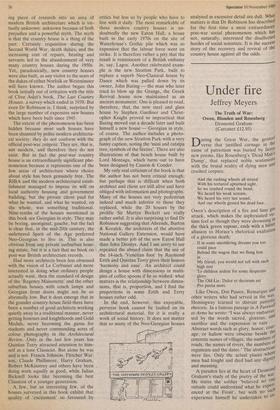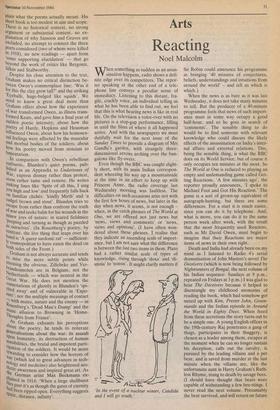Under fire
Jeffrey Meyers
The Truth of War: Owen, Blunden and Rosenberg Desmond Graham (Carcanet £12.95)
During the Great War, the genteel verse that justified carnage in the name of patriotism was buried by fierce new poems, like Rosenberg's 'Dead Man's Dump', that replaced noble sentiments with the brutal reality of dying men and crushed corpses:
And the rushing wheels all mixed With his tortured upturned sight, So we crashed round the bend, We heard his weak scream,
We heard his very last sound,
And our wheels grazed his dead face.
Owen's description of a fire and lime gas attack, which makes the asphyxiated vie- tims feel as though they were drowning in the thick green vapour, ends with a bitter allusion to Horace's rhetorical exaltation of a glorious death:
If in some smothbring dreams you too could pace Behind the wagon that we flung him in . . .
My friend, you would not tell with such high zest To children ardent for some desperate glory.
The Old Lie: Dulce et decorum est Pro patria mori.
Like Owen, Dos Passos, Remarque and other writers who had served in the war' Hemingway learned to distrust patriotier rhetoric. In a famous passage in A Farewell to Arms he wrote: 'I was always embarras,; sed by the words sacred, glorious, an' sacrifice and the expression in vain • ' Abstract words such as glory, honor, colic' age, or hallow were obscene beside the, concrete names of villages, the numbers ot. roads, the names of rivers, the numbers nt regiments and the dates.' The abstractions were lies. Only the actual places whe,re men had fought and died had any dignitY and meaning. A paradox lies at the heart of Desmond Graham's study of the poetry of the war' He states the soldier 'believed no one outside could understand what he expert enced at the Front', but with no sari experience himself he undertakes to ex" Plain what the poems actually meant. His Short book is too modest in aim and scope. There is no historical context, no strong argument or substantial content, no ex- Planation of why Sassoon and Graves are excluded, no attempt to connect the three Poets considered (two of whom were killed in 1918), no new readings — apart from `some supporting elucidation' — that go beyond the work of critics like Bergonzi, Silkin and Stallworthy. Despite his close attention to the text, Graham makes no critical distinction be- tween Owen's commonplace line: 'Was it for this the clay grew tall?' and the striking 'eyeballs, huge-bulged like squids'. We need to know a great deal more than Graham offers about how the experience of war transformed Owen, as illness trans- formed Keats, and gave him a final year of Sudden poetic intensity; about how the Poetry of Hardy, Hopkins and Housman influenced Owen; about how his homosex- ual feelings were affected by the muscular and morbid bodies of the soldiers; about nw his poetry moved from stoicism to lamentation.
In comparison with Owen's rebellious outbursts, Blunden's quiet poems, pub- lished as an Appendix to Undertones of War, express dismay rather than protest, seem rather tame and remote. He writes sinking lines like 'Spite of all this, I sing You high and low' and frequently falls back On familiar clichés: 'kindly Mirth' and 'a cudgel brown and stout'. Blunden tries to escape from rather than confront the truth of war and seeks balm for his wounds in the ,ininor joys of nature: in scared fieldmice Peeping and turning as though as puzzled as ourselves'. (In Rosenberg's poetry, by e°, ntrast, the live thing that leaps over his and is `A queer sardonic rat' — sufficient- IY cosmopolitan to have eaten the dead on both sides of the Front.) Graham is not always accurate and tends to miss the more subtle points while dressing the obvious. Zillebeke and Ver- 17andenmo1en are in Belgium, not the 'Netherlands — which was neutral in the Great War. He does not mention the e°nnotations of ghostly in Blunden's 'spi- rited away' and of vulnerable in 'Expo- tire'; nor the multiple meanings of contact With mates, nature and the enemy — in ‘osenberg's 'Dead Man's Dump' and the ironic allusion to Browning in 'Home- Thoughts from France'. ,As Graham exhausts his perceptions aonut the poetry, he tends to reiterate generalisations about the war: its assault Von humanity, its destruction of human sensibilities, the brutal and impotent parti- eriPation of the soldiers. It would be more warding to consider how the horrors of n'var (which led to great advances in tech- th°10gy and medicine) also heightened aes- trtic awareness and inspired great art. As u,e German artist Max Beckmann ex- Pn!ained in 1914: 'When a large shellburst L les past it's as though the gates of eternity "lad been ripped open. Everything suggests 'Pace, distance, infinity'.















































 Previous page
Previous page